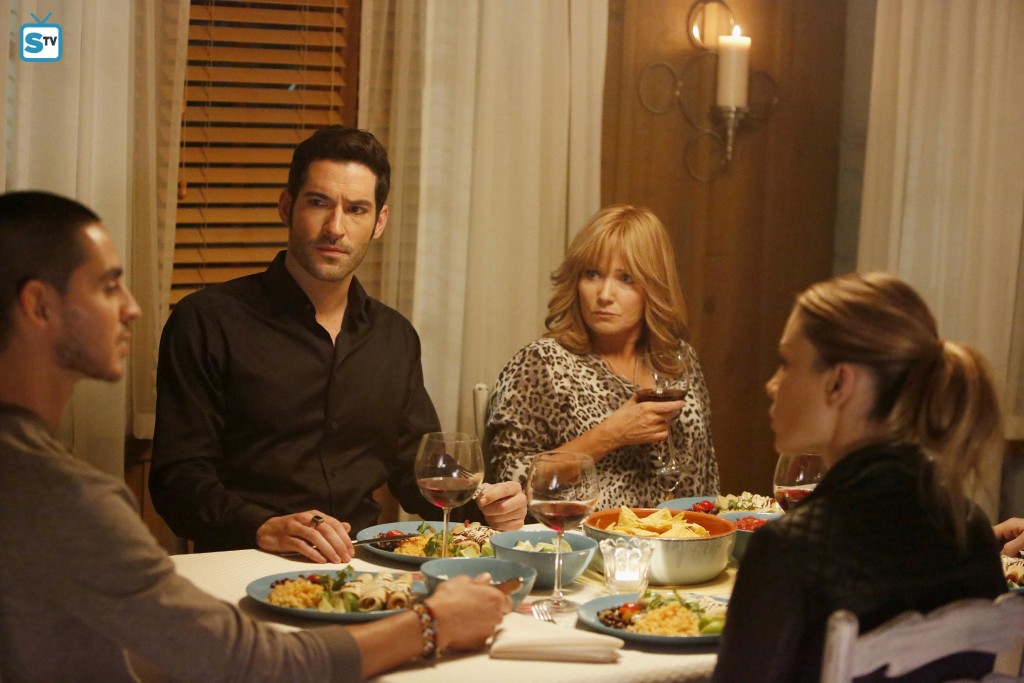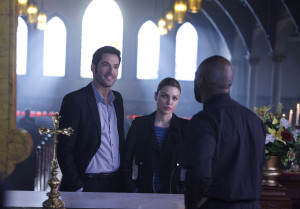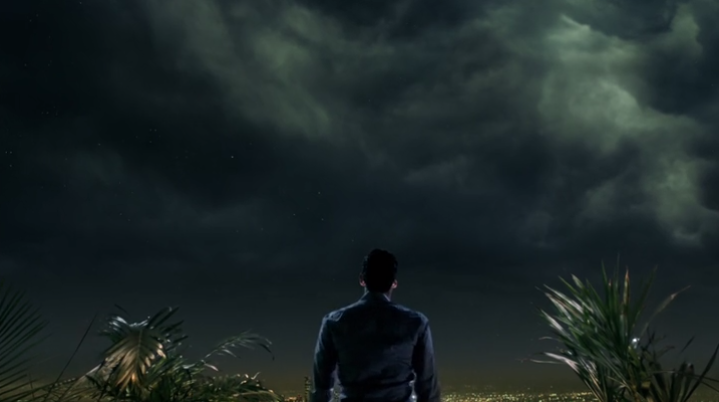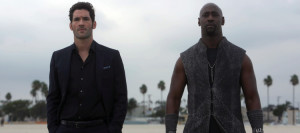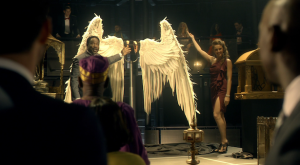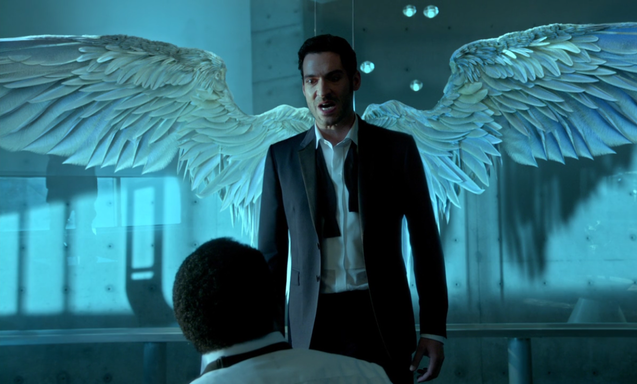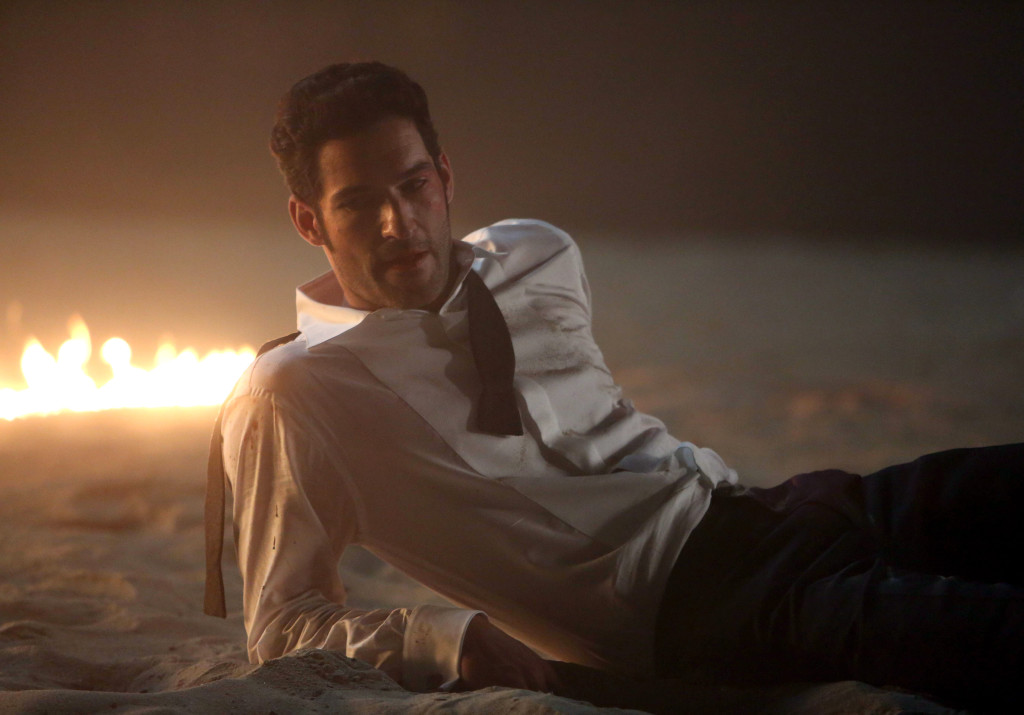Episode 6 of Lucifer, “Favorite Son,” began to play more with the show’s mythical element. Early on in the episode, for instance, Lucifer mentions in passing “the Silver City,” i.e., Heaven, and the angel Uriel, whose “welcome speech,” as far as the Devil is concerned, “is far worse than Hell…” Most significantly, of course, Lucifer’s severed wings are at the center of “Favorite Son,” their theft sending the Morningstar on something of a rampage.
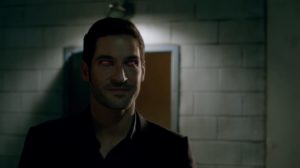
Lucifer naturally enlists Chloe’s help in the search for his stolen container, but he repeatedly evades informing her about his wings residing therein. Precisely why he does so is left rather ambiguous, but it perhaps has something to do with the vulnerability he displayed when Chloe neared the wounds where his wings once were in “Manly Whatnots.” Just why Lucifer is so possessive of his wings is also left ambiguous, but it seems apparent that his need to repossess them differs from the comic. In the Lucifer comic, the Morningstar must reclaim his wings to restore himself to full power, which Lucifer proceeds to use to form his own cosmos independent of Yahweh’s Creation; in the Lucifer show, the fallen angel appears to long for his wings as mementos of the prelapsarian state he had forever forfeited. In any event, Lucifer’s personal crisis over the robbery of his wings and his own cosmic identity comes to a head by the end of the episode as the result of Amenadiel’s tampering with the therapeutic tactics of Dr. Linda Martin.
In discussion with the duped Linda, Amenadiel adds the following to his fraudulent biography: before becoming a therapist, he underwent two years in seminary school, hence his knowledge of theology (Amenadiel actually quotes 2 Corinthians 11:14: “…Satan himself is transformed into an angel of light”). Given that Linda believes her troubling patient has adopted the persona of the Devil, Amenadiel convinces the “therapist to the Devil himself” that the problem may perhaps be “humoring his metaphor without fully embracing it.” Amenadiel suggests that Linda use some of his theological insight to make a breakthrough with the Devil, who is “essentially a rebellious son.” Amenadiel assures Linda that she will get to him, insisting that while Lucifer may not like what he hears, it will help him, his inability to understand that notwithstanding.
 The sneaky angel’s nefarious plan to covertly attack his brother by inciting Linda to prod at Lucifer’s soft spots works. Lucifer’s frustrations build up to his confrontation with his longsuffering therapist at the close of the episode, where we see Lucifer at his most vulnerable. Lucifer tries to keep up the hauteur that is his armor (“I seek no one’s approval,” he remarked earlier), but he is clearly about to unravel. Linda explains to Lucifer, “you keep trying on many hats to hide your horns—playboy, cop, club owner,” and as soon as Linda begins to explore the legend of Lucifer—starting with his prelapsarian name, which is taken from the comic—the arrogant angel swiftly begins to teeter on the edge:
The sneaky angel’s nefarious plan to covertly attack his brother by inciting Linda to prod at Lucifer’s soft spots works. Lucifer’s frustrations build up to his confrontation with his longsuffering therapist at the close of the episode, where we see Lucifer at his most vulnerable. Lucifer tries to keep up the hauteur that is his armor (“I seek no one’s approval,” he remarked earlier), but he is clearly about to unravel. Linda explains to Lucifer, “you keep trying on many hats to hide your horns—playboy, cop, club owner,” and as soon as Linda begins to explore the legend of Lucifer—starting with his prelapsarian name, which is taken from the comic—the arrogant angel swiftly begins to teeter on the edge:
LINDA. …[B]efore you fell, you were known as Samael, the Lightbringer.
LUCIFER. I don’t go by that name anymore.
LINDA. That was the name that connotated your Father’s love for you.
LUCIFER. Ha. Right. Was casting His son into Hell also an expression of His love?
LINDA. No, God didn’t cast you out of Heaven because He was angry with you.
LUCIFER. How can you presume to know God’s intentions?
LINDA. Oh, I don’t. I can’t.
LUCIFER. Then maybe stick within the limits of your intellectual capacity.
LINDA. Or maybe my simplicity offers me a different perspective. God cast you out because He needed you to do the most difficult of jobs. It was a gift—
LUCIFER. —Gift?! He shunned me. He vilified me. He made me a torturer.
While the precise details of Lucifer’s fall from Heaven remain mysterious, leaving us to speculate, for instance, over why he rebelled against God and whether or not he led a war in Heaven, Lucifer is clearly indignant about the outcome of his break with his Father. The Devil insists that if he has done evil, the fault lies with the Almighty Himself (“He made me a torturer”), but more importantly Lucifer is most deeply offended by God damning his proud name to slander via irresponsible mortals scapegoating the Devil for their sins:
LUCIFER. Can you even begin to fathom what it was like? Eons spent providing a place for dead mortals to punish themselves. I mean, why do they blame me for all their little failings as if I spent my days sitting on their shoulder forcing them to commit acts they’d otherwise find repulsive? Oh, “the Devil made me do it!” I have never made any one of them do anything. Never.1
LINDA. What happened to you is unfair.
LUCIFER. Unfair? This is unjust. For all eternity my name will be invoked to represent all their depravity. That is the “gift” that my Father gave me.
Linda persists in arguing that, despite damning His favorite son, God has always loved Lucifer, however mysterious the ways in which God expresses that love might be. It is at this point that Lucifer begins to break down, and the reaction the second mention of his original angelic name Samael incites—“Do not call me that, please”—is indicative of his impending eruption. When Linda tries to convince the distraught Devil that God’s fallen angel can rise, a teary-eyed Lucifer pleads in frustration that he cannot—that he literally cannot, as his wings remain stolen. The intense scene ends explosively, Lucifer losing his temper and punching a hole in Linda’s wall, leaving his therapist dumbfounded and frightened as he exits, abashed.
 “Favorite Son” concludes with a damaged Lucifer overlooking the City of Angels, pining for his pilfered wings as Mazikeen eyes the scars on his back which the severance of his wings by her hand has left. As we are finally shown Lucifer’s resplendent angel wings in an unknown location, the episode ends, leaving us speculating about various things, such as whether Lucifer’s wings have self-healed, as in the comic,2 or they have always remained feathery, and, more importantly, why Lucifer longs to repossess his wings in the first place. To me, Lucifer’s violent reaction to Linda’s insistence that he can ascend seemed to imply that within him is some desperate hope of being reinstated in Heaven.
“Favorite Son” concludes with a damaged Lucifer overlooking the City of Angels, pining for his pilfered wings as Mazikeen eyes the scars on his back which the severance of his wings by her hand has left. As we are finally shown Lucifer’s resplendent angel wings in an unknown location, the episode ends, leaving us speculating about various things, such as whether Lucifer’s wings have self-healed, as in the comic,2 or they have always remained feathery, and, more importantly, why Lucifer longs to repossess his wings in the first place. To me, Lucifer’s violent reaction to Linda’s insistence that he can ascend seemed to imply that within him is some desperate hope of being reinstated in Heaven.
If Fox’s Lucifer pines for the loss of Heaven, he fits within the Miltonic-Romantic tradition. In Milton’s Paradise Lost, Satan hates God, but he loves Heaven, the fallen archangel refusing to part with the celestial paradise he belonged to, continuing to assert himself and his “Hell-doom’d” (II.697) brethren as “Sons of Heaven” (I.654), determined “To claim our just inheritance of old…” (II.38). Satan is, in short, Hell-bent on regaining Heaven, vowing that his “puissant Legions, whose exíle / Hath emptied Heav’n, shall…re-ascend / Self-rais’d, and repossess thir native seat…” (I.632–34). The tragic truth, however, is that Milton’s Satan cannot escape Hell, due to
The Hell within him, for within him Hell
He brings, and round about him, nor from Hell
One step no more than from himself can fly
By change of place… (IV.20–23)
As Satan himself pithily puts it, “Which way I fly is Hell; myself am Hell…” (IV.75). Despite the fallen archangel’s lament for the loss of Heaven—for “what I was / In that bright eminence” (IV.43–44)—and the despair his inescapable Hell subjects him to, Milton’s Satan is not prepared to make amends with the Almighty; too proud to ever bend the knee, Satan rejects even the thought of atonement because repentance requires “submission; and that word / Disdain forbids me…” (IV.81–82). The point of my digression: Fox’s Lucifer follows the Miltonic-Romantic tradition if he longs for the heavenly homeland he resents being ousted from, but should he stoop to longing for the forgiveness of his “punisher” (Paradise Lost, IV.103), Lucifer will be breaking from tradition.
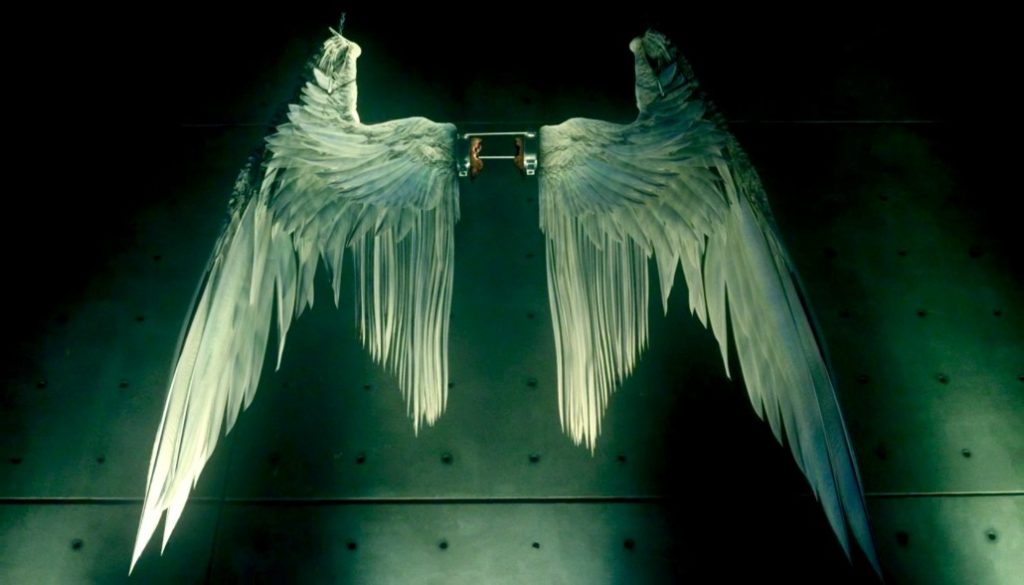
“Favorite Son” was a more favorable episode of Lucifer, particularly in its final scenes, which presented the fallen angel at his most Byronic yet (“I’m a walking paradox”) and got the character closest to his comic book counterpart, even quoting from Vertigo’s Lucifer directly. The difference, of course, is that Fox’s Lucifer appears more a hurt (and perhaps abused) child than Mike Carey’s exiled proud Prince. In any event, “Favorite Son” showed that the Lucifer show can be more than a comically risqué police procedural with the Devil (and the accompanying hellish puns) in the mix, and it will be interesting to see how Lucifer’s character develops going forward.
Notes
1. This is taken nearly verbatim from the Vertigo Lucifer’s departing speech to Morpheus as he quits being the Devil and closes down Hell: “Can you imagine what it was like? Ten billion years spent providing a place for dead mortals to torture themselves? And like all masochists, they called the shots. ‘Burn me.’ ‘Freeze me.’ ‘Eat me.’ ‘Hurt me.’ And we did. Why do they blame me for all their little failings? They use my name as if I spent my entire day sitting on their shoulders, forcing them to commit acts they would otherwise find repulsive. ‘The Devil made me do it.’ I have never made one of them do anything. Never.” (Mike Carey, Lucifer: Evensong [New York: DC Comics, 2007], p. 143; cf. Neil Gaiman, The Sandman: Season of Mists [New York: DC Comics, 2010], “Episode 2.”)↩
2. See Mike Carey, Lucifer: Children and Monsters (New York: DC Comics, 2001), pp. 79–80.↩
